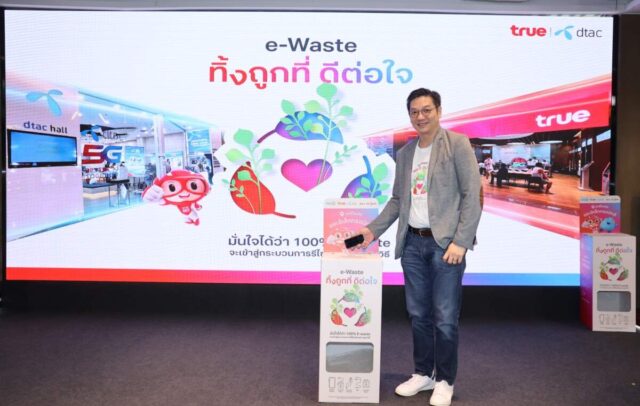Thailand telecom giant True has launched an e-waste recycling program as it looks to prevent mobile phones from being thrown in the trash. Collection points have been established throughout the country, including all True Shop, TrueSphere and Dtac shops, with the scheme expected to eventually include universities and schools.
“One of True’s missions in becoming a fully-fledged telecom-tech company is to manage its environmental impacts,” True CEO Khun Manat Manavutiveth noted. “The world generates up to 54 metric tons of e-waste a year, and this is projected to reach 75 metric tons in 2030.”
To that end, True hopes to collect one million phones during the first year of the recycling program. All Now Logistics will support e-waste logistics from the dropoff points while a leading e-waste recycling company is responsible for recycling in line with international standards.
“True and Dtac brands are both sales distribution channels for millions of mobile phones and devices annually,” Khun Manat explained. “The company is well aware of its responsibility to appropriately manage e-waste in an integrated manner and based on international standards.”
True believes the e-waste recycling program will help the company reach its sustainablity goals. The telecom player currently aims to become carbon-neutral and zero e-waste to landfill by 2030.
According to True, recycling one mobile phone reduces 12.6 kilograms of carbon dioxide emissions while recycling one million mobile phones is equivalent to carbon dioxide emissions from 1,368 cars. Electronic waste has proven to be an issue for Thailand as it is not biodegradable and can pollute soil, air, water, flora and fauna.
Also Interesting: Here’s the eco-friendly way Thailand destroyed $11 million worth of counterfeit products
Interesting Analysis
While not a gamechanger, True launching an e-waste recycling program is something positive. Disposing of cellphones and other electronics is a significant pain point. Many people, myself included, end up keeping old phones and laptops simply because no one knows what to do with them. Others chuck them in the trash which is the absolute worst thing to do.
Keep Reading: Havaianas aims to recycle the flip-flops it sells in Asia Pacific


































